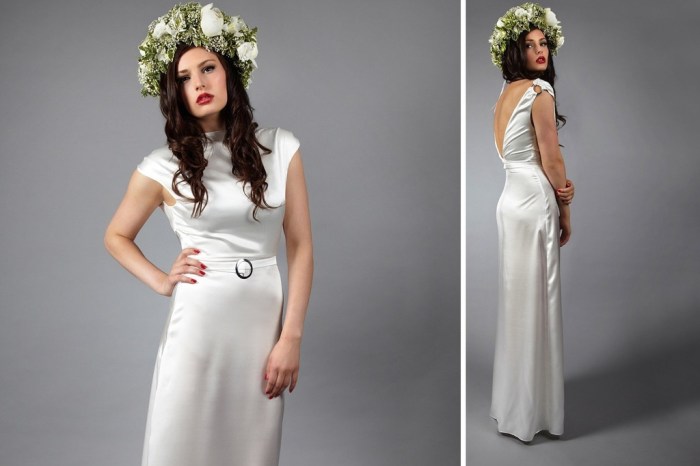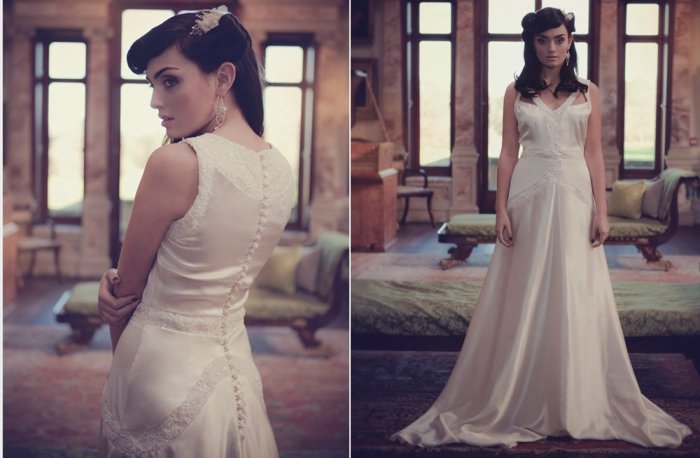Luxury and Price Point of 100% Silk Wedding Dresses: 100 Silk Wedding Dress
100 silk wedding dress – The allure of a 100% silk wedding dress lies not only in its exquisite drape and luxurious feel but also in its significant price point. Understanding the factors that contribute to this cost is crucial for brides-to-be navigating their wedding budget.
Silk Wedding Dress Price Comparison
The cost of a 100% silk wedding gown varies considerably depending on several factors. A direct comparison with other fabrics helps illustrate this price range.
| Fabric Type | Price Bracket (USD) | Average Price (USD) | Notes |
|---|---|---|---|
| 100% Silk | $2,000 – $10,000+ | $5,000 | Price highly dependent on silk type, embellishments, and designer. |
| Satin | $500 – $3,000 | $1,500 | More affordable than silk, offers a similar sheen. |
| Lace | $800 – $4,000 | $2,000 | Price varies greatly depending on lace quality and complexity. |
| Crepe | $700 – $2,500 | $1,500 | A more structured fabric, generally less expensive than silk. |
Factors Influencing Silk Wedding Dress Prices
Several key factors influence the final price of a 100% silk wedding dress. These include the type of silk used, the extent of embellishments, and the designer’s reputation.
- Silk Type: Higher-quality silks, such as charmeuse or silk crepe de chine, command higher prices than less luxurious varieties.
- Embellishments: Intricate beading, embroidery, or lace appliqués significantly increase the cost of the dress.
- Designer: Established designers with a strong reputation often charge a premium for their craftsmanship and brand recognition.
Hypothetical Pricing Structure for 100% Silk Wedding Dresses
This hypothetical pricing structure demonstrates how different factors impact the cost. These are estimates and actual prices may vary.
| Silk Type | Embellishment Level | Price (USD) |
|---|---|---|
| Habotai Silk | Minimal | $2,500 |
| Crepe de Chine | Moderate (beading on bodice) | $4,000 |
| Charmeuse Silk | Extensive (lace appliqués and beading) | $7,000 |
Sustainability and Ethical Sourcing of Silk
Choosing a sustainable and ethically sourced silk wedding dress reflects a commitment to environmental responsibility and fair labor practices. Understanding the impact of silk production is crucial in making an informed decision.
Environmental Impact of Silk Production
While silk is a natural fiber, its production isn’t entirely without environmental impact. Compared to synthetic fabrics, silk production generally has a lower carbon footprint but requires careful consideration of water usage and potential pesticide use.
- Water Usage: Mulberry trees, the primary food source for silkworms, require significant water for irrigation.
- Pesticide Use: Pesticides may be used in mulberry cultivation, potentially harming beneficial insects and the environment.
- Waste Management: Proper disposal of silk waste is crucial to minimize environmental impact.
Ethical Silk Certifications
Several certifications aim to ensure ethical and sustainable silk production. These certifications provide transparency and assurance to consumers.
- Global Organic Textile Standard (GOTS): Certifies organic silk production that meets strict environmental and social criteria.
- Fairtrade: Ensures fair wages and working conditions for silk farmers and workers.
- OEKO-TEX Standard 100: Tests for harmful substances in textiles, including silk.
Sustainable Practices in Silk Production
Several sustainable practices can minimize the environmental impact of silk production.
- Organic Mulberry Farming: Using organic farming methods reduces pesticide use and protects biodiversity.
- Water Conservation Techniques: Implementing efficient irrigation systems minimizes water waste.
- Waste Recycling: Recycling silk waste reduces landfill burden and conserves resources.
Care and Maintenance of 100% Silk Wedding Dresses
Proper care and maintenance are essential to preserve the beauty and quality of a 100% silk wedding dress for years to come. Understanding the correct cleaning and storage methods will ensure its longevity.
Cleaning and Storage Methods

Source: onewed.com
Silk is a delicate fabric requiring specialized care. Dry cleaning is generally recommended, ideally by a professional specializing in delicate fabrics. Avoid harsh chemicals or excessive heat.
- Dry Cleaning: Choose a reputable dry cleaner experienced in handling silk garments.
- Storage: Store the dress in a breathable garment bag in a cool, dry, and dark place, away from direct sunlight and moisture.
- Acid-Free Tissue Paper: Use acid-free tissue paper to prevent yellowing or discoloration.
Risks of Improper Care
Improper care can lead to irreversible damage to a silk wedding dress.
- Staining: Spills and stains are difficult to remove from silk without professional cleaning.
- Damage: Rough handling, improper storage, or exposure to harsh chemicals can cause tears, discoloration, or weakening of the fabric.
Finding a Reputable Cleaner, 100 silk wedding dress
Finding a reputable professional cleaner is crucial for preserving your silk wedding dress. Seek recommendations from bridal boutiques or wedding planners, and always check reviews before entrusting your dress to a cleaner.
Design and Aesthetics of 100% Silk Wedding Dresses

Source: onewed.com
The unique drape and texture of 100% silk create a luxurious and elegant aesthetic in wedding dresses. Different types of silk offer diverse qualities suitable for various styles.
Silk Types and Their Suitability
Various silk types contribute unique characteristics to wedding dress designs.
- Charmeuse: Known for its lustrous sheen and smooth drape, ideal for flowing silhouettes.
- Crepe de Chine: A slightly textured silk with a matte finish, suitable for both structured and flowing designs.
- Habotai: A lightweight and sheer silk, often used for linings or delicate overlays.
Silk Wedding Dress Design Examples
Here are three distinct examples of 100% silk wedding dress designs:
A classic A-line silhouette in ivory charmeuse silk, featuring delicate spaghetti straps and subtle beading along the waistline. The dress exudes timeless elegance.
A modern sheath dress in blush crepe de chine silk, with a high neckline and long sleeves. The dress is minimalist yet sophisticated, showcasing the fabric’s subtle texture.
A romantic ballgown in white habotai silk, with layers of delicate tulle overlay and intricate floral embroidery. The dress is ethereal and dreamy, perfect for a fairytale wedding.
Shopping and Selection of 100% Silk Wedding Dresses
Choosing a 100% silk wedding dress requires careful consideration of several factors to ensure a perfect fit, style, and budget.
Key Considerations When Choosing a Silk Wedding Dress
Before making a purchase, consider these important factors.
- Fit: Ensure a proper fitting to guarantee comfort and a flattering silhouette.
- Style: Choose a style that complements your body type and personal style.
- Budget: Set a realistic budget and stick to it.
- Silk Type: Consider the characteristics of different silk types and their suitability for your desired style.
Finding Reputable Retailers or Designers
Research and find reputable retailers or designers specializing in 100% silk wedding dresses. Read reviews and visit boutiques to assess quality and service.
Questions to Ask a Designer or Retailer
Asking the right questions ensures you’re making an informed decision.
- What type of silk is used in the dress?
- What is the origin of the silk?
- What are the care instructions for the dress?
- What is the return policy?
- What is the turnaround time for alterations?
FAQs
How long does it take to get a custom 100% silk wedding dress?
Lead times for custom silk wedding dresses vary greatly depending on the designer and complexity of the design. Expect anywhere from 6 to 12 months, or even longer.
Can I alter a 100% silk wedding dress myself?
Altering a silk wedding dress is best left to professionals due to the delicate nature of the fabric. Improper alterations can easily damage the garment.
What are some alternative sustainable fabrics for wedding dresses?
Sustainable alternatives include organic cotton, linen, hemp, and peace silk.
How can I tell if a silk wedding dress is truly 100% silk?
Look for certifications from reputable organizations and request fabric samples to examine the texture and feel. A reputable seller should be able to provide this information.
